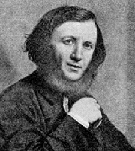May 7: Robert Browning
Robert Browning (1812)
It was on this date, May 7, 1812, that the English Victorian poet Robert Browning was born in London. He was born into a wealthy family and well educated and, although Oxford and Cambridge universities would not admit him because of his religion, he attained a deep and thorough knowledge of the Bible and Christianity from his earliest days. He may have been helped in his religious education in an unexpected way by his Evangelical/Nonconformist mother, who allowed the 14-year-old Browning to read Percy Bysshe Shelley’s “atheistical” 1813 poem “Queen Mab,” after which he declared himself an atheist. But although Browning was able to emancipate himself from Christian belief by the time he was 18, he remained a Theist. “Who knows most,” said Browning, “doubts most.” And, 34 years later, in a poem called “Gold Hair,” he wrote, “The candid incline to surmise of late / that the Christian faith may be false, I find.” His narrative poem “Christmas Eve” portrays divine truth as unreachable through denominational religion, making worship a personal choice; “Easter Day,” the second part of this 1850 poem, is a dialogue which argues that doubt is essential to faith.
Yet Browning still used religious language to characterize his ideas. So in “Pippa Passes” (1841), we find the lines, “God's in His heaven— / All's right with the world!” In "Andrea del Sarto" (1855) we read, “Ah, but a man's reach should exceed his grasp, / Or what's a heaven for?” At the 1861 death of his strongly religious wife, the famous Victorian poet Elizabeth Barrett Browning, Browning may have discarded any remaining Christian beliefs, writing in his verse novel The Ring and the Book, "Mothers, wives, and maids, / There be the tools wherewith priests manage men."
He did have his skeptical, critical thinking side: Browning believed spiritualism to be the result of fraud, and wrote in a letter to The Times saying “the whole display of hands, spirit utterances etc., was a cheat and imposture,” following up with a caricature of the “medium” Daniel Dunglas Home in the 1864 poem, “Sludge the Medium.”
Browning died on 12 December 1889 at age 77 in Venice, Italy, and was buried in the Poet’s Corner, Westminster Abbey. It was for the philosopher George Santayana to best characterize Browning’s relationship with (or without) his faith—
In Browning this religion takes the name of Christianity, and identifies itself with one or two Christian ideas arbitrarily selected; but at heart it has far more affinity to the worship of Thor or of Odin than to the religion of the Cross. The zest of life becomes a cosmic emotion; we lump the whole together and cry, “Hurrah for the Universe!” A faith which is thus a pure matter of lustiness and inebriation rises and falls, attracts or repels, with the ebb and flow of the mood from which it springs. It is invincible because unseizable; it is as safe from refutation as it is rebellious to embodiment.*
In his poetry, Robert Browning speaks much of God, but admitted, “I am no Christian.”
* George Santayana, Interpretations of Poetry and Religion (New York, Scribners, 1900), pp. 24,29,30.
Originally published May 2003 by Ronald Bruce Meyer.


